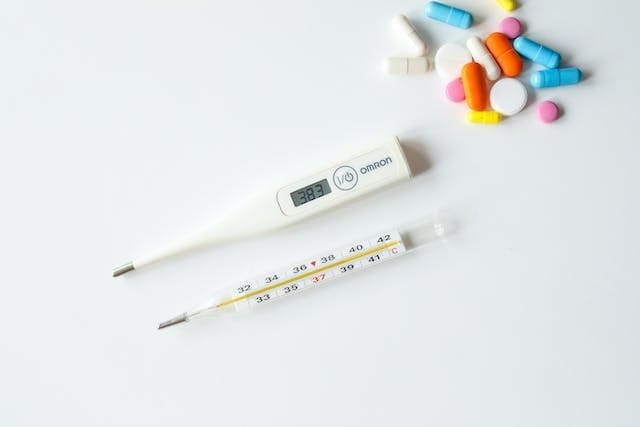
What is the Widal Typhoid test? What are the Symptoms of Typhoid?
Time to read 3 min
Time to read 3 min
The widal test is a blood test that is used for diagnosing typhoid fever and the presence of the salmonella typhi bacteria. If the bacteria is present and you are experiencing symptoms, then getting antibiotics started is important.
You can get the blood test done and visit a hospital if you are experiencing complications or danger-zone symptoms. It can take more than a week for you to heal from the fever and have your body create the necessary antibodies.
If you have the following symptoms of typhoid fever then getting a widal test done is important. The test can provide preliminary insights into whether your fever is connected to typhoid. If the test is positive, then you would need to get treatment started in the form of antibiotics.
A high-grade fever which can be around 103-104F can be a sign of typhoid fever. It is one of the first signs for the diagnosis of typhoid fever in the event that you have been exposed with the bacteria. The widal typhoid test is performed in this case immediately.
One of the main symptoms of typhoid fever is a pain in the body that isn't connected to other underlying conditions. The test for typhoid fever and the analysis of the Salmonella typhi can be done within the widal test package.
There may be pain to the extent of requiring medical attention on the joints and muscles. You can experience this symptom as a result of an immune response, which can also lead to lower strength.
The red rash and spots of typhoid fever is one of the main symptoms when it comes to diagnosis. You should be able to get treatment started if you also have a significant fever along with the spots.
A sense of low energy is an important factor when it comes to diagnosis. You may experience this as the fever develops, which can lead to other symptoms forming.
If you are experiencing hallucinations and states of delirium, then getting a test done is important.
It is important to know how typhoid spreads so that you're aware of the potential risk factors present. You can also prevent a recurrence of typhoid fever by following best practices and avoiding these situations.
Drinking water from public taps and in areas where there may be water collected, can be places where there may be a risk of typhoid spreading.
Public restrooms may also be centres for the specific bacteria that proliferates as well.
Food contamination is another vital part of typhoid fever spreading.
Ice from outside providers or at local dining locations may be housing centres for the salmonella typhi bacteria.
If you have typhoid and require medication then doctors can prescribe antibiotics such as ciprofloxacin or ofloxacin. You would also have to follow the guidelines for typhoid fever and take precautions to protect your immune system from further load.
The medication can be prescribed for around 7-10 days. You may need longer to recover fully prior to engaging in regular activities.
There are several risks involved in typhoid escalating and not being treated in a timely manner. You could develop a range of secondary symptoms or conditions that may emerge with unique complications.
You should check for the symptoms of the following risks and complications, so that you're protected from their effects as you recover. You should also get tested multiple times to check if you have the typhoid antibodies.
Inflammation of the organs and other parts of the body can be a critical risk area for typhoid. You may have additional risk of heart conditions, lung inflammation, etc. which can be critical.
When your immune health is low, then there may be a risk factor of pneumonia present. You should visit a hospital if you start getting pneumonia symptoms which are chest pain, difficulty breathing properly, fatigue, etc.
Lung infections are one of the more common risk areas associated with typhoid. You should check your VO2 max, breathing capability, and whether there may be fluid in your lungs.
Hallucinations and delirium may be risk factors associated with typhoid. You can experience a range of signs related to this, which is why getting tested is key.

